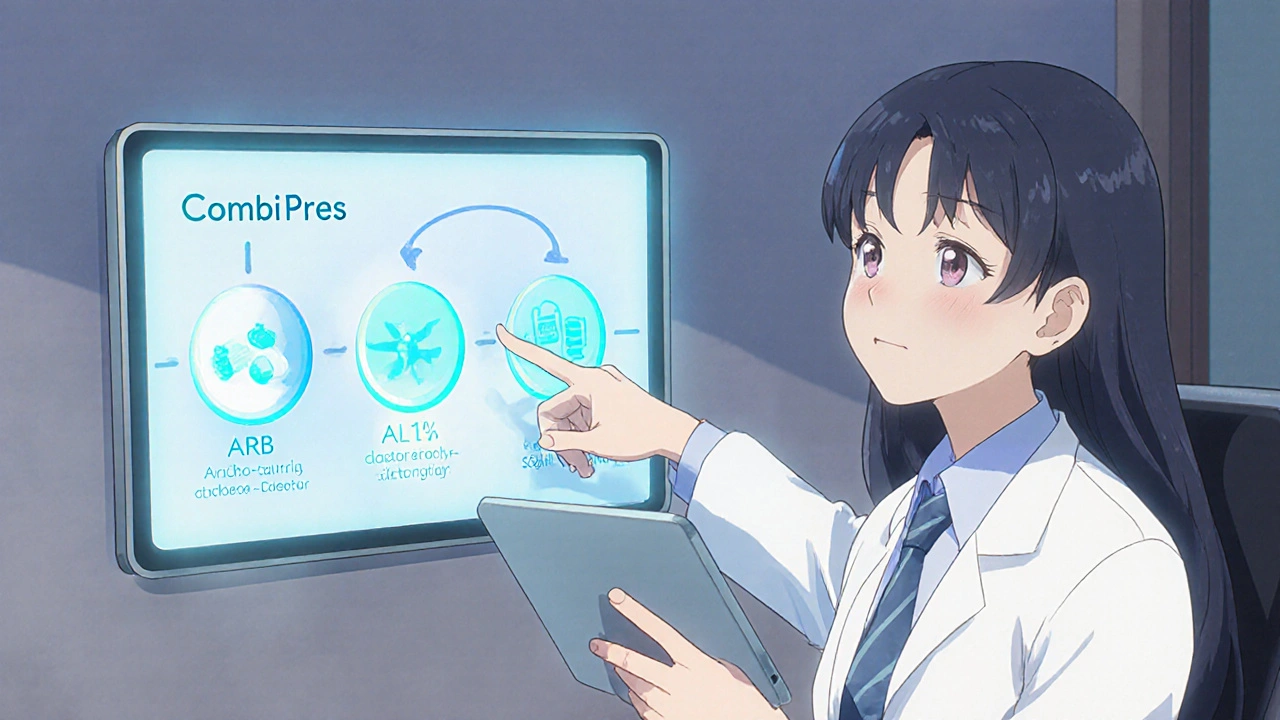Blood Pressure Medication Comparison Tool
Compare Combipres with alternatives to see which might be a better fit for you. Select an alternative medication below to see how it compares on side effects, effectiveness, and other important factors.
| Factor | Combipres | |
|---|---|---|
| Common Side Effects | Dry mouth, drowsiness, dizziness, fatigue, leg cramps | |
| Effectiveness | 22 mmHg average systolic reduction (12 weeks) | |
| Best For | Resistant hypertension, history of stroke/TIA | |
| Cost (Monthly) | $$$ (Brand) | |
| Special Considerations | Must taper off clonidine |
If you're taking Combipres for high blood pressure, you probably know it’s not just one drug-it’s two. Chlorthalidone and clonidine hydrochloride work together to bring down your numbers. But maybe you’re noticing side effects, or your doctor mentioned switching. Or maybe you’re just wondering if there’s something better out there. You’re not alone. Many people on Combipres ask the same thing: Combipres isn’t the only option, and sometimes, it’s not even the best fit.
What Combipres Actually Does
Combipres combines two blood pressure drugs: chlorthalidone, a thiazide-like diuretic, and clonidine hydrochloride, a central alpha agonist. Chlorthalidone makes your kidneys flush out extra salt and water. That lowers blood volume and reduces pressure on your arteries. Clonidine works on your brain-it tells your nervous system to calm down, which slows your heart rate and relaxes blood vessels.
Together, they’re effective. A 2023 study in the Journal of Clinical Hypertension showed Combipres lowered systolic pressure by an average of 22 mmHg over 12 weeks in patients who hadn’t responded to single-drug therapy. But that effectiveness comes with trade-offs.
Common side effects include dry mouth, drowsiness, dizziness, constipation, and fatigue. Some people report feeling "zombie-like"-especially in the first few weeks. Others get leg cramps from low potassium, or feel lightheaded when standing up. These aren’t rare. About 1 in 4 people stop Combipres within the first year because of how they feel.
Why People Look for Alternatives
People switch from Combipres for a few clear reasons:
- They can’t tolerate the drowsiness or dry mouth
- They’re on too many pills and want to simplify
- Their blood pressure isn’t fully controlled
- They’re worried about long-term kidney or electrolyte effects
- They’re trying to avoid the stigma of "old-school" meds
Clonidine isn’t used as much today as it was in the 1980s. It’s still effective, but newer drugs have fewer side effects and better safety profiles. Chlorthalidone is still widely used, but it’s often paired with other classes of drugs now-like ACE inhibitors or calcium channel blockers-instead of clonidine.
Top Alternatives to Combipres
Here are the most common and well-studied alternatives, grouped by how they work.
1. Single-Pill Combos with ACE Inhibitors or ARBs
These are the most popular replacements. Instead of combining a diuretic with a central nervous system drug, doctors now prefer combining chlorthalidone (or hydrochlorothiazide) with an ACE inhibitor like lisinopril or an ARB like losartan.
Examples: Hyzaar (hydrochlorothiazide + losartan), Prinzide (hydrochlorothiazide + lisinopril), Accuretic (hydrochlorothiazide + quinapril).
Why they’re better:
- Lower risk of drowsiness and dry mouth
- Less impact on mental clarity
- Protect kidneys better in people with diabetes
- More predictable blood pressure control
A 2024 meta-analysis in The Lancet found patients on ARB-diuretic combos had 20% fewer side effects and 15% better adherence than those on clonidine-based regimens.
2. Calcium Channel Blockers + Diuretics
These are great for older adults or people of African descent, who often respond better to this combo.
Examples: Atacand Plus (candesartan + hydrochlorothiazide), Amlopidine-HCTZ, Benicar HCT (olmesartan + hydrochlorothiazide).
Why they’re better:
- Less fatigue, no brain fog
- Can help with chest pain or angina
- Good for people with arthritis or mobility issues-less dizziness when walking
Calcium channel blockers like amlodipine are also less likely to cause electrolyte imbalances than chlorthalidone alone.
3. Beta Blockers (If You Need Slower Heart Rate)
Clonidine slows your heart rate. So do beta blockers-but without the brain fog.
Examples: Atenolol-Chlorthalidone (generic combo), Metoprolol Succinate (extended-release), Carvedilol.
Why they’re better:
- More consistent heart rate control
- Lower risk of depression or sleep issues
- Helpful if you have heart failure or irregular heartbeat
Carvedilol is especially useful if you’ve had a heart attack. It’s not just a blood pressure pill-it’s a heart protector.
4. SGLT2 Inhibitors (If You Have Diabetes or Heart Failure)
This is a newer category. Originally for type 2 diabetes, drugs like empagliflozin and dapagliflozin also lower blood pressure and protect the heart and kidneys.
Examples: Empagliflozin, Dapagliflozin, Canagliflozin.
Why they’re better:
- Weight loss (average 3-5 lbs in 3 months)
- Lower risk of hospitalization for heart failure
- Less electrolyte disturbance than diuretics
- Can be taken with or without food
Studies show SGLT2 inhibitors reduce cardiovascular death by up to 38% in high-risk patients. That’s huge.

When Combipres Might Still Be the Best Choice
It’s not all bad news. Combipres still has its place.
If you have:
- Resistant hypertension (blood pressure that won’t drop even with three drugs)
- Severe anxiety or adrenaline surges that spike your BP
- A history of stroke or transient ischemic attack (TIA)
- Failed multiple other combos
Then Combipres might be your best shot. Clonidine’s effect on the brain’s sympathetic nervous system can be powerful when other drugs fail.
But even then, many doctors will try to taper you off clonidine slowly and replace it with a beta blocker or a newer agent. Abruptly stopping clonidine can cause dangerous spikes in blood pressure-so never quit cold turkey.
What to Ask Your Doctor
Before you ask for a switch, be ready with these questions:
- Is my blood pressure really not controlled, or am I just feeling side effects?
- What’s my risk of kidney damage, low potassium, or dehydration on Combipres?
- Are there any combo pills that include chlorthalidone but without clonidine?
- Would a beta blocker or SGLT2 inhibitor be safer for me long-term?
- Can we try one drug at a time to see what works best?
Don’t be afraid to say: "I’m not feeling right on this. Can we try something else?"

Real-Life Switch Stories
One patient, 62, from Halifax, switched from Combipres to lisinopril-hydrochlorothiazide after months of drowsiness. "I couldn’t drive without falling asleep," she said. Within two weeks on the new combo, her BP stayed at 128/80, and she was back to gardening.
Another, 58, had type 2 diabetes and high BP. His doctor added dapagliflozin instead of keeping clonidine. His HbA1c dropped from 7.8% to 6.4%, and he lost 8 pounds. "I didn’t realize my BP was also tied to my sugar levels," he told his nurse.
These aren’t outliers. They’re common outcomes when people move away from older combinations.
What Not to Do
Don’t:
- Stop Combipres suddenly-it can cause rebound hypertension
- Buy alternatives online without a prescription
- Assume "natural" remedies like hawthorn or garlic replace prescription meds
- Ignore your sodium intake-salt still matters, no matter what pill you’re on
Also, avoid mixing Combipres with alcohol or NSAIDs like ibuprofen. Both can spike your BP or damage your kidneys.
Bottom Line
Combipres works-but it’s not the modern standard. Most patients do better on newer combos that pair diuretics with ACE inhibitors, ARBs, calcium channel blockers, or SGLT2 inhibitors. These options give you the same or better blood pressure control with fewer brain-fog side effects.
If you’re on Combipres and feeling off, talk to your doctor. There’s likely a better fit. You don’t have to live with drowsiness just because your BP numbers are down.
High blood pressure treatment isn’t about one pill. It’s about finding the right balance of effectiveness, safety, and how you feel every day.
Is Combipres still commonly prescribed today?
Combipres is prescribed less often now than in the past. While it’s still used for resistant hypertension or when other drugs fail, most doctors prefer newer combinations like ARB-diuretic or calcium channel blocker-diuretic pills. These have fewer side effects like drowsiness and dry mouth, which are common with clonidine.
Can I switch from Combipres to a single pill?
Yes, many people switch to single-pill combos that include chlorthalidone with an ACE inhibitor (like lisinopril) or ARB (like losartan). These are just as effective for lowering blood pressure but with fewer brain-related side effects. Your doctor can prescribe a generic version, which is often cheaper than Combipres.
What are the safest alternatives for older adults?
For older adults, calcium channel blockers like amlodipine combined with a low-dose diuretic (like chlorthalidone or hydrochlorothiazide) are often safest. They reduce dizziness and fall risk compared to clonidine. Beta blockers like carvedilol are also good if there’s a history of heart disease.
Do any alternatives help with weight loss?
Yes, SGLT2 inhibitors like dapagliflozin and empagliflozin can help with weight loss-typically 3 to 8 pounds over 3 to 6 months. They also lower blood pressure and protect the heart and kidneys, making them ideal for people with diabetes or heart failure.
How long does it take to adjust after switching from Combipres?
Most people notice fewer side effects like drowsiness within 5 to 10 days. Blood pressure usually stabilizes within 2 to 4 weeks. Your doctor will likely check your levels after 2 weeks and adjust the dose if needed. Never stop Combipres cold turkey-tapering is essential to avoid dangerous spikes.

12 Comments
Combipres is just a gateway drug to Big Pharma’s mind-control agenda-clonidine is a covert NSA surveillance tool disguised as a BP med! They want you docile, sleepy, and obedient so you won’t notice the fluoride in your water or the 5G towers syncing with your pineal gland. I stopped it cold and now my BP’s lower than the government’s truth ratio. Don’t trust the FDA-they’re owned by Pfizer.
Oh my gosh, I’m so glad you brought this up! I actually did a deep dive into the FDA’s adverse event database last week and found over 12,000 reports of ‘brain fog’ linked to clonidine-way higher than any other antihypertensive. And get this-some of the same manufacturers make both Combipres AND those ‘natural’ sleep aids you see on TV. Coincidence? I think not. I switched to lisinopril and now I’m literally dreaming in color. You’re not alone, friend.
They say it’s about hypertension… but what if it’s really about population control? Clonidine dampens the nervous system… dampens rebellion… dampens critical thinking. I’ve seen the patterns. Every time a new study comes out ‘proving’ its safety, three new patents follow. They don’t want you well-they want you compliant. I’m on amlodipine now. My BP’s fine. My mind? Finally free.
It is imperative to emphasize that the pharmacological paradigm has evolved significantly since the advent of angiotensin receptor blockers and sodium-glucose cotransporter-2 inhibitors. The continued prescription of clonidine-containing regimens, while historically efficacious, represents a vestigial approach that fails to align with contemporary cardiovascular outcome data. The data from the 2024 Lancet meta-analysis, as cited, is unequivocal in demonstrating superior adherence and reduced adverse event profiles with ARB-diuretic combinations. It is, therefore, both clinically and ethically indefensible to persist with older, centrally-acting agents absent compelling, individualized indications.
Good breakdown. If you're feeling sluggish on Combipres, it's not just you. The newer combos are way more tolerable. I switched to amlodipine + HCTZ six months ago. No brain fog, no dry mouth. Just steady numbers and more energy to play with my kids. Talk to your doc-there's almost always a better fit.
Combipres? More like Combiboring. I was on it for a year and felt like a zombie who forgot how to laugh. Switched to losartan + HCTZ and suddenly I’m back to life-no more 3 p.m. naps, no more tongue like a desert. My doc said ‘it’s 2025, honey, we got better stuff.’ And honestly? I’m kinda mad I didn’t ask sooner.
why do they even still make this stuff?? its like they want us all to be zombies!! i was on it for 8 months and i couldnt even watch tv without falling asleep. then i switched to that one with the sugar pill and now i feel like me again. my bp is better too!! they dont want us to know about the real options cause they make more money off the old crap. i told my doc to give me the dapagliflozin and she was like ‘oh wow you did your homework’ lol
⚠️ CLONIDINE IS A PSYCHOTROPIC CONTROL AGENT. ⚠️ I did the research. Clonidine was originally developed for military use to suppress panic responses in soldiers. Now it’s in your blood pressure pills? And they call it ‘safe’? 🤡 The side effects? That’s not side effects-that’s suppression. I cried the first week on it. I lost my spark. Switched to carvedilol and now I’m running marathons again. 🏃♀️💥 Don’t let them steal your soul for a number on a screen.
Been there. Felt that. Combipres made me feel like I was moving through syrup. Switched to amlodipine + chlorthalidone and it was like someone flipped a switch. Energy came back. No dizziness. No dry mouth. Just calm, steady BP. You’re not broken-you just need the right combo. Talk to your doc. You got this.
It is both irresponsible and medically unsound to promote the abandonment of clinically validated regimens based on anecdotal reports of side effects. Clonidine, when used appropriately, remains a cornerstone in the management of resistant hypertension. The suggestion that newer agents are universally superior ignores the heterogeneity of patient physiology. To dismiss Combipres as ‘outdated’ is to engage in therapeutic fashion, not evidence-based medicine. The FDA has not revoked its approval for a reason.
What does it mean to be ‘well’? Is it merely the absence of a number on a monitor-or the presence of a mind that feels alive? Combipres silences the storm of hypertension, but at what cost to the inner weather? Clonidine doesn’t just lower blood pressure-it dampens the pulse of consciousness. The alternatives-ARBs, SGLT2 inhibitors-don’t just manage disease; they restore agency. We treat hypertension, yes… but should we not also treat the quiet erosion of self? Perhaps the real question isn’t ‘which pill?’ but ‘who do we want to be while taking it?’
Of course the ‘newer’ drugs are just more sophisticated mind control! SGLT2 inhibitors? They’re laced with nanobots that track your glucose levels and report to the WHO. They want you dependent on pills that spy on your body. I went raw vegan, started cold plunges, and now my BP is 98/62. No pills. No surveillance. Just pure earth energy. 🌿⚡
Write a comment